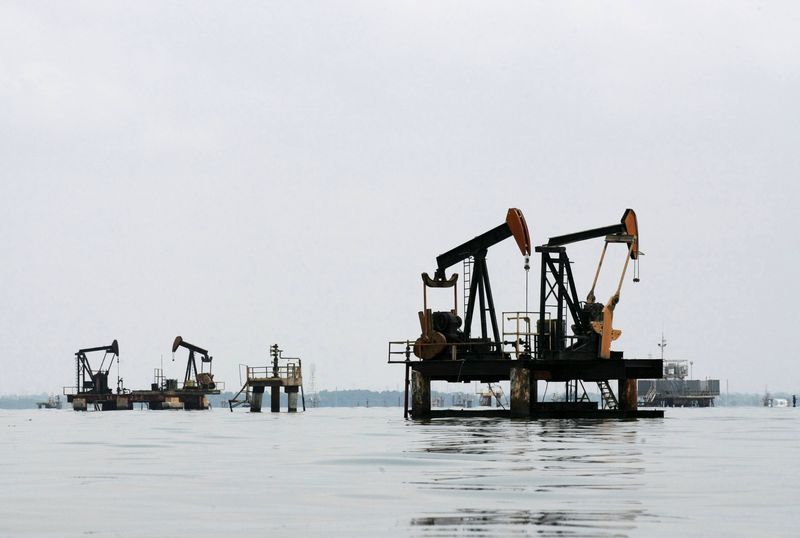By Sonali Paul
MELBOURNE, July 28 (Reuters) - Oil prices rose for a third
straight day on Tuesday, buoyed by support for demand coming
from efforts to stimulate the U.S. economy's recovery from the
coronavirus crisis and a weakening of the dollar that makes
crude cheaper for global buyers.
Brent crude LCOc1 futures climbed 35 cents, or 0.8%, to
$43.76 a barrel at 0118 GMT, adding to a 0.2% gain on Monday.
U.S. West Texas Intermediate (WTI) crude CLc1 futures
gained 27 cents, or 0.7%, to $41.87 a barrel, building on a
0.75% rise on Monday.
U.S. Senate Republicans on Monday proposed a $1 trillion
coronavirus aid package worked out with the White House to
revitalise the economy with expanded unemployment benefits for
millions due to expire this week, although Democrats urged more
support. Further aiding the stimulus, the U.S. Federal Reserve's
policy-setting panel meets on Tuesday and Wednesday, where it is
expected to reiterate it will keep interest rates near zero for
years to come. "Oil prices will continue to draw support from the Fed's
dovish policy, which sees the U.S. dollar move lower," AxiCorp
market strategist Stephen Innes said in a note.
The U.S. dollar dropped to its lowest in nearly two years
against a basket of six other major currencies USD= on the
back of a surge in U.S. coronavirus cases. Florida and
California have now both overtaken the previous epicentre, New
York. "For oil prices to break out higher, there must be a
significant flattening of the U.S. Sunbelt COVID-19 case count
curve at a minimum," Innes said.
Traders will be watching out for U.S. inventory data due
from the American Petroleum Institute industry group later on
Tuesday and the government on Wednesday. Refined products
stockpiles are expected to have declined last week, while crude
oil stockpiles are expected to have held steady, five analysts
polled by Reuters estimated. On the down side for fuel demand, Europe's largest low-cost
airline, Ryanair, on Monday cut its annual passenger target by a
quarter after bookings were hit in recent days, and warned a
second wave of COVID-19 infections could lower that further.
- English (USA)
- English (UK)
- English (India)
- English (Canada)
- English (Australia)
- English (South Africa)
- English (Nigeria)
- Deutsch
- Español (España)
- Español (México)
- Français
- Italiano
- Nederlands
- Português (Portugal)
- Polski
- Português (Brasil)
- Русский
- Türkçe
- العربية
- Ελληνικά
- Svenska
- Suomi
- עברית
- 日本語
- 한국어
- 简体中文
- 繁體中文
- Bahasa Indonesia
- Bahasa Melayu
- ไทย
- Tiếng Việt
- हिंदी
Oil prices rise on U.S. stimulus hopes, weaker U.S. dollar
Published 07/28/2020, 09:22 AM
Updated 07/28/2020, 09:30 AM
Oil prices rise on U.S. stimulus hopes, weaker U.S. dollar

Latest comments
Install Our App
Risk Disclosure: Trading in financial instruments and/or cryptocurrencies involves high risks including the risk of losing some, or all, of your investment amount, and may not be suitable for all investors. Prices of cryptocurrencies are extremely volatile and may be affected by external factors such as financial, regulatory or political events. Trading on margin increases the financial risks.
Before deciding to trade in financial instrument or cryptocurrencies you should be fully informed of the risks and costs associated with trading the financial markets, carefully consider your investment objectives, level of experience, and risk appetite, and seek professional advice where needed.
Fusion Media would like to remind you that the data contained in this website is not necessarily real-time nor accurate. The data and prices on the website are not necessarily provided by any market or exchange, but may be provided by market makers, and so prices may not be accurate and may differ from the actual price at any given market, meaning prices are indicative and not appropriate for trading purposes. Fusion Media and any provider of the data contained in this website will not accept liability for any loss or damage as a result of your trading, or your reliance on the information contained within this website.
It is prohibited to use, store, reproduce, display, modify, transmit or distribute the data contained in this website without the explicit prior written permission of Fusion Media and/or the data provider. All intellectual property rights are reserved by the providers and/or the exchange providing the data contained in this website.
Fusion Media may be compensated by the advertisers that appear on the website, based on your interaction with the advertisements or advertisers.
Before deciding to trade in financial instrument or cryptocurrencies you should be fully informed of the risks and costs associated with trading the financial markets, carefully consider your investment objectives, level of experience, and risk appetite, and seek professional advice where needed.
Fusion Media would like to remind you that the data contained in this website is not necessarily real-time nor accurate. The data and prices on the website are not necessarily provided by any market or exchange, but may be provided by market makers, and so prices may not be accurate and may differ from the actual price at any given market, meaning prices are indicative and not appropriate for trading purposes. Fusion Media and any provider of the data contained in this website will not accept liability for any loss or damage as a result of your trading, or your reliance on the information contained within this website.
It is prohibited to use, store, reproduce, display, modify, transmit or distribute the data contained in this website without the explicit prior written permission of Fusion Media and/or the data provider. All intellectual property rights are reserved by the providers and/or the exchange providing the data contained in this website.
Fusion Media may be compensated by the advertisers that appear on the website, based on your interaction with the advertisements or advertisers.
© 2007-2024 - Fusion Media Limited. All Rights Reserved.